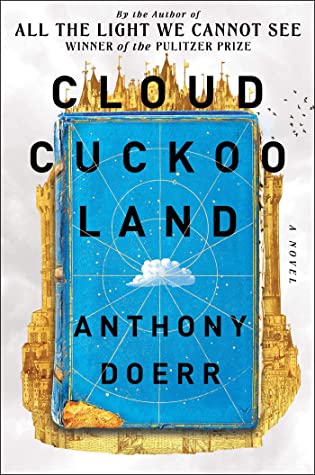SNQ: Anthony Doerr’s “Cloud Cuckoo Land”
by Miles Raymer

Summary:
Anthony Doerr’s Cloud Cuckoo Land is a stunning and elegant work of modern fiction. Taking inspiration from an ancient novel by Antonius Diogenes that survives merely as “a few papyrus fragments” and a “ninth-century plot summary” (Author’s Note), Doerr weaves together three narrative arcs from different eras in humanity’s past, present, and future. One takes place during the 15th-century Siege of Constantinople, one in Lakeport, Idaho during the 20th and 21st centuries, and one in an imagined future where a small group of humans desperately seeks to escape a dying Earth. Each tale is intimately rendered by Doerr’s exquisite prose and keen attention to detail, and each is connected to the others in surprising and profound ways. This “paean to books,” as Doerr puts it, examines the painfully-contingent nature of human knowledge and memories, as well as the heroic lengths undertaken to keep them alive over the course of deep time. The settings and circumstances depicted in this novel are often grim, but Cloud Cuckoo Land is above all a hopeful story that will inspire readers without pandering to them.
Key Concepts and Notes:
- Cloud Cuckoo Land grabbed me from the opening pages and held my rapt attention for its entire 600+ page-count. As with his previous novel, All the Light We Cannot See, Doerr’s present-tense voice is superb. The chapters are also short and easy to digest.
- There are strong elements of climate fiction throughout the novel that feel both authentic and nuanced. Doerr manages to be intelligently skeptical of modern technology and artificial intelligence without coming off as a luddite or dirt-worshipper. One central concern is the insidious process by which climate activists can become radicalized, and the question of whether redemption and learning are possible in the wake of senseless violence.
- A main theme is the disillusionment that comes with realizing that something we thought was invincible or permanent is in fact not only vulnerable, but perhaps quite fragile and on the brink of destruction. On several different levels, Doerr shows how people caught up in traumatic situations can embrace adaptation and resilience rather than succumbing to depression or despair.
- Doerr also explores the dynamics of self-knowledge and self-acceptance, demonstrating how these virtues are worth pursuing even in the face of repeated setbacks.
- Cloud Cuckoo Land is a novel that takes many risks, all of which pay off; it’s one of those rare books that probably ought not to work but somehow comes together perfectly. I recommend it to anyone longing to marvel at just how amazing modern fiction can be.
Favorite Quotes:
A text––a book––is a resting place for the memories of people who have lived before. A way for the memory to stay fixed after the soul has traveled on…But books, like people, die. They die in fires or floods or in the mouths of worms or at the whims of tyrants. If they are not safeguarded, they go out of the world. And when a book goes out of the world, the memory dies a second death. (51-2)
There is nobility in being a part of an enterprise that will outlast you. (213)
It has taken him his whole life to accept himself, and he is surprised to understand that now that he can, he does not long for one more year, one more month: eighty-six years has been enough. In a life you accumulate so many memories, your brain constantly winnowing through them, weighing consequence, burying pain, but somehow by the time you’re this age you still end up dragging a monumental sack of memories behind you, a burden as heavy as a continent, and eventually it becomes time to take them out to the world. (542)
By age seventeen he’d convinced himself that every human he saw was a parasite, captive to the dictates of consumption…He realizes that the truth is infinitely more complicated, that we are all beautiful even as we are all part of the problem, and that to be a part of the problem is to be human. (568)
Tell us what he found inside the goddess’s magic book.
When Aethon peered into it…He saw the heavens and the earth and all its lands scattered around the ocean, and all the animals and birds upon it. The cities were full of lanterns and gardens, and he could faintly hear music and singing, and he saw a wedding in one city with girls in bright linen robes, and boys with gold swords on silver belts, jumping through rings, doing handsprings and leaping and dancing in time. But on the next page he saw dark, flaming cities in which men were slaughtered in their fields, their wives enslaved in chains, and their children pitched over the walls onto pikes. He saw hounds eating corpses, and when he bent his ear low to the pages, he could hear the wailing. And as he looked, turning the leaf over and back, Aethon saw that the cities on both sides of the page, the dark ones and the bright ones, were one and the same, that there is no peace without war, no life without death, and he was afraid. (580)
Just finished it this week myself and agree on all points. Really a splendid work of fiction that, as you note, shouldn’t work, but does in a way that is captivating.
Wonderful, Jim! Really glad that you enjoyed the book as well. 🙂
[…] Doerr, Pulitzer Prize-winning author of Cloud Cuckoo Land (not banned) wrote, “A text, a book, is a resting place for the memories of people who have lived […]